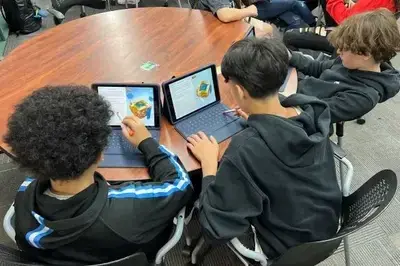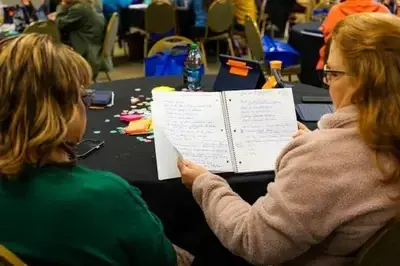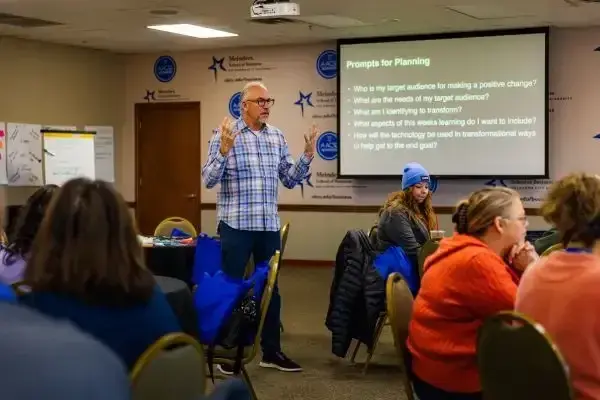
The age-old challenge for classroom teachers everywhere – how to get students interested in learning the material they’re trying to teach. Better yet, how do you transform students’ opinions of school from the last place they want to be to the place they never want to leave?
An Apple tech training academy held at OCU last fall is paying immediate dividends in the form of student engagement at two schools in Muskogee, and most likely more around the state.
That academy is part of an ongoing partnership between Apple and OCU, which started in 2022 when Apple awarded OCU more than $880,000 in funds and equipment to support the company’s Community Education Initiative. With these funds, OCU began to work with the Cherokee, Chickasaw and Choctaw tribes to provide educational opportunities to Native American youth and other underserved people who live on tribal reservations in Oklahoma.
Two of the academy’s participants have become strong advocates, saying the program has supercharged their educational outcomes in their respective schools soon after they received the technological learning tools that were part of the initial grant.
Lavina Stepp, library media specialist at Pershing Elementary School, teaches other teachers on how to teach with technology. She also hosts an after-school club that became an instant hit once the iPads arrived.
“So many kids wanted to come – I couldn’t say no,” Stepp said. “These things are so popular, we’ve had to come up with special ways to share so everyone can use them.”
Stepp said after the training academy in October, her school received large boxes containing a variety of tech-related teaching materials. Along with the 40 iPads there were charging stations, various software applications, an Apple TV box, and perhaps what may be the most popular devices – 10 drones and a kit to create an obstacle course to fly them through. The drones were donated by OCU Trustee Phil Busey.
“There was a lot more than we asked for. We just kept opening more and more boxes, not even knowing what everything was until we got it out and started looking through it,” she said.
The clubs this spring were divided into two age groups. There were a few more than 30 students in each – a Tuesday club for kindergarten through second-grade students and a Thursday club for third through fifth.
Stepp attributes several academic success stories to the tech, in part because the school has more leverage in getting students interested in the educational-yet-fun activities.
“If you’re in trouble at school, you’re not allowed to come to coding. Students make sure they’re doing what they’re supposed to so they can participate,” she said.
In one of the club sessions, the students celebrated “fairytale week” with their own creative presentations. They started by reading popular fairytales like “Goldilocks and the Three Bears” and “Three Billy Goats Gruff.” They used the iPads to tell their own versions of the stories in their own styles using the apps they’d been learning.
“They were coming up with all kinds of fun ways to tell their stories. They were teaching me new things on these apps,” she said.
Stepp says the technology will also go a long way in helping students learn their heritage and share it with others.
“They need to know where they came from. We encourage them to bring their own stories, their legends. We want to help them retell their stories, help them discover where they came from and where we can go from here,” she said.
“For some of these students in the past, they only came to class so their parents don’t go to jail,” Stepp said. “Now they WANT to come to school.
“We want to give them this knowledge and these opportunities. Once they have it, there’s no telling what they can do. When we put this in the hands of these kids, they will ‘wow’ us with what they can do.”

Stepp has been through a lot of training academies and says the Apple sessions are the best she’s attended thus far.
“It was so well organized and professional. The trainers were very helpful and great at sharing their knowledge. They encouraged us to shoot for the stars,” she recalled.
Melissa Million teaches seventh-grade ELA and hosts after-school tech-related programs like a “Reading Squad,” an iPad-based coding program and a drone program. Her teaching peers have also seen the magnitude of the new tech.
Million learned about the Apple Community Education program from an email message circulated amongst her school’s teachers.
“At first, it seemed like it was going to be a lot of work. But I thought, ‘you know what? I’m going to try it out and see what happens,’” she said.
Once the gear arrived Million knew she made the right decision. As someone who teaches reading, Million appreciates how the iPads have made the process more fun and engaging without having to beg her students to read the assigned material.
“When it comes to coding, you have to actually read the material. You have to read the instructions to get the code to work right,” she noted.
One of her students appears to have changed his entire life trajectory for the better.
“This was his first experience in a public school setting. He had been kicked out of schools before he came to us. When the gear arrived mid-year, he saw what it was right away and said he knew how to fly drones. He downloaded the software on his own iPad, took it home, learned how to program it, and came back to school to show me how it worked.
“He flew the drone from our classroom, down the hall to the principal’s office. A lot of students were watching, and the excitement it generated was amazing. All these other students wanted to learn how to fly it. He said, ‘first I’m going to show Mrs. Million how to use it, then I’ll teach you.”
Million is already looking forward to the next school semester, when the students will get to work with the drones early in the year and hopefully participate in competitions and explore the many different uses. She is encouraging her peers to participate in the program, if and when the invitations are sent again.
“I never would have thought of all the different ways we can use drones. There’s a lot of job opportunities out there for these,” she said. “It has helped the children who maybe didn’t have a very good shot otherwise.”
Apple and OCU have committed to continue work on this project for a second year, and hope to expand the program in the future to include additional tribal nations in Oklahoma.
An additional Teacher Training Event has been scheduled for Sept. 18-21 on the OCU campus. A new cohort of teachers will attend, and teachers who took part last year are invited back for additional training. Anyone who wants more information or to sign up for this event should contact Helen Gaudin. Read more about OCU’s collaboration with Apple here.

